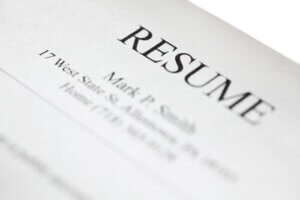Career Advice for Job Seekers
8 resume writing tips for that second job search out of college
If you’re in an entry-level job and want resume writing tips for your next job, read on.
The resume format that you used for that first job out of college is going to vary greatly for your second job. It’s not about what you did in college anymore, it’s about what you did in that first job. More specifically – it’s about results, achievements, development, and growth. And directed specifically for each job.
We asked several experts who weighed in with their resume writing tips:
1. Get rid of college extracurriculars–your resume is not a biography
Those college extracurricular activities, social clubs, and college coursework that were so important to your resume template or resume format when graduating from college, either should be moved to the bottom of the resume in an additional information section, or removed all together. You don’t need a list of college classes anymore, and only include brief sentences or details about social clubs, or extracurricular activities, if included.
“You will then free up some space on your resume to include your current job experience and key accomplishments which you spent the past months/years cultivating,” says Terra Eison, Food, Beverage, and Culinary Recruiter for Hilton Worldwide, a global hospitality company. “Recruiters are more interested in your work experience and how your skills align with the open position.”
A resume isn’t a career biography. It’s a marketing tool that quickly shows the next employer your background matches their needs. So understand this: When it comes to updating your resume for that next step in your career, you don’t need to include everything on your resume, says Mike McGuiness, Executive Director of Jobipedia, a non-profit organization that provides career advice for entry-level workers from a network of US-based hiring professionals at America’s top employers.
“Include the information and experiences related to the job you’re applying for,” says McGuiness. “Highlight the skills and experiences that are transferrable to the new role.”
2. Move education underneath work experience
Now that you have job experience, that’s more important to highlight then you actual degree, says Eison. Recruiters spend less than 30 seconds – some studies say six seconds – to review a resume, so it’s important to have your work experience front and center on a resume. They want to see where you worked, and more important, what you achieved. When they scan the rest of the resume, they will then look for education. But education, is no longer what will stand out, even if you went to a so-called prestigious university.
Also read our Definitive Guide to Resume Writing for Students and Grads
3. Focus on results from that first job, not responsibilities
 Focus on your job responsibilities and be very detailed and include quantifiable achievements. Include any key projects and accomplishments that may be important for the role you are applying to.
Focus on your job responsibilities and be very detailed and include quantifiable achievements. Include any key projects and accomplishments that may be important for the role you are applying to.
Whenever possible, include numbers and statistics, says McGuiness. These jump out to a recruiter and are a quick way to indicate your impact and value in previous positions. “Increased donations by 30% after implementing an annual silent auction” or “Managed a call center that received over 1,000 calls daily.”
4. Highlight certifications, training programs, stretch assignments and ongoing career or professional development
“It’s important for employers to know that you are invested in your career and are hungry to keep learning and developing,” says Eison.
If you attended a key industry conference, completed a certification or training class (whether online or in-person), reference this. For example, if you work in digital marketing and became Google AdWords Certified, or if you were trained on Adobe Experience Manager, list that. Better yet, list that with a success story/project example using those skills/programs.
In addition, recruiters are looking for candidates with great leadership skills. If you have taken on any additional responsibilities, projects or stretch assignments at your first job, you should include this on your resume.
“Companies are looking for ambitious leaders who are eager to learn and grow with their organizations,” says Eison
5. Highlight soft skills
Listing soft skills is important when writing a resume, because if a company is going to hire you, they will often train you using their own, unique processes.
“Those soft skills – like leadership, communication and team work – are harder to train, so companies want people that have those skills coming into the role,” says McGuiness.
But don’t just say you’re a “strong communicator” on your resume. Instead, show how you’re a strong communicator: “Presented quarterly earnings to senior directors and relayed their recommendations back to the team.”
Related: Communication skills factor into who gets promoted
6. Write the resume to fit the job description
 Know this – a general, one-size fits all resume can work, but a resume that is targeted to each and every job works better. Create a targeted resume by reading each job description, and then using the language in the job description when writing your resume. Highlight achievements, skills, and technology that match the job description.
Know this – a general, one-size fits all resume can work, but a resume that is targeted to each and every job works better. Create a targeted resume by reading each job description, and then using the language in the job description when writing your resume. Highlight achievements, skills, and technology that match the job description.
“When applying for any position, at any level in your career, scan the job description and mimic frequently used keywords,” says McGuiness. “Most large employer utilize applicant tracking systems to help them sort hundreds, sometimes thousands of resumes to find the strongest candidates.”
The resumes that are a match to that job description, get noticed.
Related: Avoid common resume mistakes and stand out
7. Open with a strong summary statement
Take the guess work out of the recruiters hands and let them know what position you are interested in based on your skill sets, goals and passion, by creating a strong opening summary statement, says Eison. This isn’t a long-winded paragraph. This is short and to the point, like this:
Seeking financial analyst role where 2+ years of experience at a Fortune 100 organization will add value.
Bold the key terms, results, and language in that summary, and throughout the resume.
“Your resume will be skimmed at first, so make sure to bold your titles and other areas where you want to capture the hiring manager’s attention,” says McGuiness. “If they are intrigued, they’ll read more.”
Said Eison: “If you don’t have a clear summary, recruiters may wrongly assume the role you are applying to or they may not be able to decide where your skills would be an asset for the organization and your resume may be placed in the no pile.”
8. Proofread proofread proofread
“My biggest pet peeve is misspelled words and grammatical errors on resumes,” says Eison.
But it’s difficult to catch your own resume writing mistakes, so have a career coach, trusted colleague, roommate, significant other, or family member proofread your resume. Let’s be clear though: Asking someone (other than a career coach or recruiter whom you may know) to review your resume in terms of resume format or resume layout, is asking for trouble. Your roommate may be a great salesperson, but that doesn’t mean they are skilled at critiquing resumes. Your mom or dad be able to catch grammatical errors, but unless they work in HR, hire, recruit, or manage employees, their specialty is not “critiquing resumes” so save that for the professionals. But proofreading, that’s important. And anyone who can assist reading/reviewing the resume can catch mistakes.
Go to the last page of your resume and read it from the bottom to the top. Looking at it this way can give you another view and help provide clarity to each sentence and give one final proof for spelling, grammar, and/or formatting issues.
“The attention to detail in formatting, spelling, and grammar may seem trivial, but it can certainly make a huge difference and this may help you land an interview and ultimately getting your next job,” says Eison.
Use these resume writing tips to stand out, get noticed, and get an interview. Then in time, you’ll land that second job out of college, and continue to advance in your career.
New Job Postings
Advanced Search